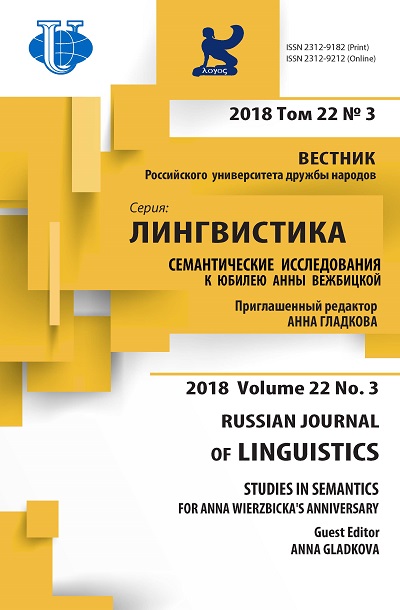Russian Words for ‘freedom’ Revisited
- 作者: Shmelev A.D1
-
隶属关系:
- Moscow Pedagogical State University
- 期: 卷 22, 编号 3 (2018): Studies in semantics: for Anna Wierzbicka’s anniversary
- 页面: 675-700
- 栏目: 语义学研究:为纪念安娜-维尔兹比卡
- URL: https://journals.rudn.ru/linguistics/article/view/19352
- DOI: https://doi.org/10.22363/2312-9182-2018-22-3-675-700
如何引用文章
全文:
详细
作者简介
Alexei Shmelev
Moscow Pedagogical State University
编辑信件的主要联系方式.
Email: shmelev.alexei@gmail.com
Professor of Russian Linguistics at Moscow Pedagogical State University, the head of the Department of Linguistic Standards of Russian at the Russian Language Institute of the Russian Academy of Sciences and a Professor of Theoretical Linguistics at St. Tikhon’s Orthodox University. His work spans a number of disciplines including cultural studies and linguistics. He is the author of numerous books, most recently, Russkaja aspektologija: v zashchitu vidovoj pary [Russian Aspectology: in Defense of the Aspectual Pair] (2015, co-authored with Anna Zalizniak and Irina Mikaelian). 1 Malaia Pirogovskaia St., Moscow 119991, Russia
参考
- Арутюнова Н.Д. Воля и свобода // Логический анализ языка. Космос и хаос: концептуальные поля порядка и беспорядка. М.: Индрик, 2003. С. 73—99. [Arutyunova, N.D. (2003). Russian words for ‘freedom’. In Arutyunova, N.D. (ed.) Logical analysis of language: conceptual fields of order and disorder. Moscow: Indrik, 73—99. (In Russ.)]
- Гура А.В. Воля // Славянские древности: этнолингвистический словарь. Т. 1. М.: Междунар. отношения, 1995. С. 428—230. [Gura, A.V. (1995). A Russian word for ‘freedom’. In Slavic antiquities: ethnological dictionary, 1. Moscow: Mezhdunar. otnosheniya, 428—230. (In Russ.)]
- Кошелев А.Д. К эксплицитному описанию концепта «свобода» // Логический анализ языка. Культурные концепты. М.: Наука, 1991. С. 61—64. [Koshelev, A.D. (1991). The concept of freedom explicated. In Arutyunova, N.D. (ed.) Logical Analysis of Language. Cultural Concepts. Moscow: Nauka, 61—64. (In Russ.)]
- Топоров В.Н. Об иранском элементе в русской духовной культуре // Славянский и балканский фольклор. М.: Наука, 1989. С. 23—60. [Toporov, V.N. (1989). The Iranian element in the Russian spiritual culture. In Tolstoi, N.I. (ed.) Slavic and Balkan folklore. Moscow: Nauka, 1989, 23—60. (In Russ.)]
- Топорова Т.В. Семантическая структура древнегерманской модели мира. М.: Радикс, 1994. [Toporova, T.V. (1994). The semantic structure of ancient German world model. M.: Radiks. (In Russ.)]
- Урысон Е.В. Еще раз о СВОБОДЕ и ВОЛЕ // Сокровенные смыслы. Слово. Текст. Культура. Сборник статей в честь Н.Д. Арутюновой. М.: Языки славянской культуры, 2004а. С. 694—703. [Uryson, E.V. (2004a). SVOBODA and VOLYA revisited. In Apresjan, Ju.D. (ed.) Hidden meanings. Word. Text. Culture. Festschrift to honor N.D. Arutyunova. Moscow: Yazyki slavyanskoi kul'tury, 694—703. (In Russ.)]
- Урысон Е.В. СВОБОДА 1.1, ВОЛЯ 4.1 // Новый объяснительный словарь синонимов русского языка. М.: Языки славянской культуры; Wiener slawistischer Almanach, 2004б. С. 1003— 1007. [Uryson, E.V. (2004b). Russian words for ‘freedom’. In Apresjan, Ju.D. (ed.) New Explanatory Dictionary of Russian. Moscow: Yazyki slavyanskoi kul'tury; Wiener slawistischer Almanach, 1003—1007. (In Russ.)]
- Шмелев А.Д. Лексический состав русского языка как отражение «русской души» // Булыгина Т.В., Шмелев А.Д. Языковая концептуализация мира (на материале русской грамматики). М.: Школа «Языки русской культуры», 1997. С. 481—495. [Shmelev, A.D. (1997). Russian lexicon as a reflection of the “Russian soul”. In Bulygina, T.V. & Shmelev, A.D. (1997). Linguistic conceptualization of the world (viewed through the Russian grammar). Moscow: Shkola “Yazyki russkoi kul'tury”, 481—495. (In Russ.)]
- Шмелев А.Д. «Широта русской души» // Логический анализ языка: Языки пространств. М.: Языки русской культуры, 2000. С. 357—367. [Shmelev, A.D. (2000). “Broad Russian soul”. In Arutyunova, N.D. & I.B. Levontina (eds) Logical analysis of language: Languages of space. Moscow: Yazyki russkoi kul'tury, 357—367. (In Russ.)]
- Шмелев А.Д. В поисках мира и лада // Логический анализ языка. Космос и хаос: концептуальные поля порядка и беспорядка. М.: Индрик, 2003. С. 54—72. [Shmelev, A.D. (2003). In search of peace and harmony. In Arutyunova, N.D. (ed.) Logical analysis of language: conceptual fields of order and disorder. Moscow: Indrik, 54—72. (In Russ.)]
- Шмелев А.Д. Частица там как маркер «несущественной детали» // Язык как материя смысла. Сб. статей к 90-летию академика Н.Ю. Шведовой. М.: Азбуковник, 2007. С. 208—216. [Shmelev, A.D. (2007). The particle tam as a marker of an unimportant detail. In M.V. Lyapon (ed.) Language as a matter of meaning. Festschrift in honor of N.Yu. Shvedova 90th birthday. Moscow: Azbukovnik, 208—216. (In Russ.)]
- Шмелев А.Д. Историческая память слова в прозе Александра Солженицына: мир и воля // Солженицынские тетради. Вып. 2. М.: Русский путь, 2013. С. 115—135. [Shmelev, A.D. (2013). The historical memory of words in the prose of Aleksanrdr Solzhenitsyn: The Russian words mir and volia. Studying Solzhenitsyn. Issue 2. Moscow: Russkii put', 115—135. (In Russ.)]
- Milner-Gulland, Robin R. (1997). The Russians. Oxford; Malden, MA: Blackwell publishers. Offord, Derek (1986). The Russian Revolutionary Movement in the 1880s. Cambridge: Cambridge University Press.
- Stockdale, Melissa (1999). The Constitutional Democratic Party. In Geifman, Anna (ed.) Russia under the last tsar: opposition and subversion, 1894-1917, Malden, MA: Blackwell Publishers Ltd, 164-169.
- Wierzbicka, Anna (1997). Understanding Cultures through their Key Words: English, Russian, Polish, German, and Japanese. Oxford: Oxford Univ. Press.
- Wierzbicka, Anna (2006). English: Meaning and culture. Oxford: Oxford Univ. Press. Yarmolinsky, Avrahm (1956). Road to Revolution: A Century of Russian Radicalism. New York: Macmillan.














